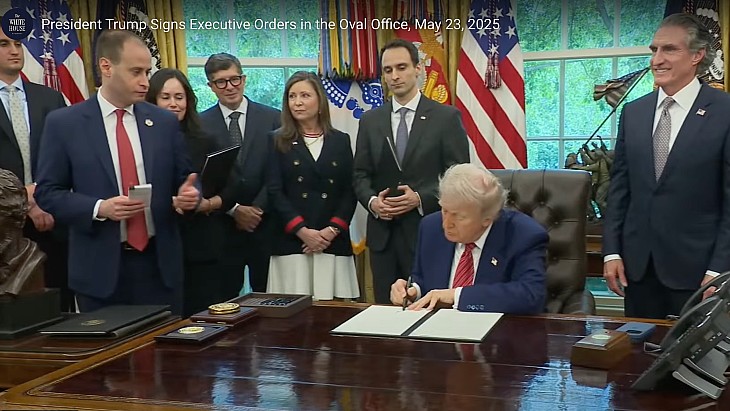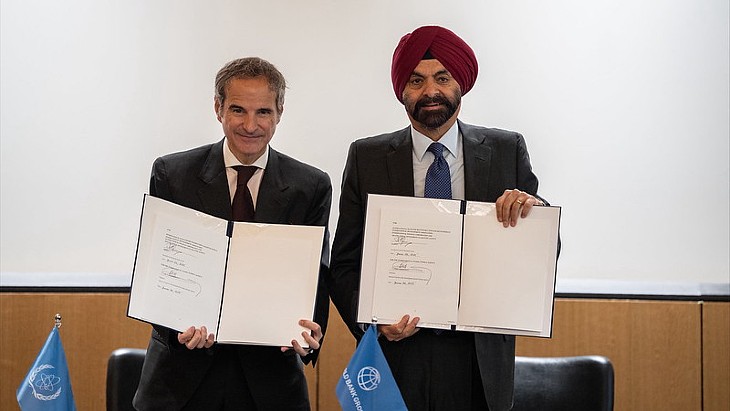Human cost stressed as action planned to tackle delay and denial of shipments
.jpg)
The Australian-led side event at the gathering in Vienna, Austria, was entitled Enhancing Access to the Peaceful Uses of Nuclear: Addressing Delays in and Denials of Shipment with International Atomic Energy Agency (IAEA) Director General Rafael Mariano Grossi attending to add his voice to those seeking to find a solution to the issue.
The IAEA defines a denial of shipment as "an explicit or implicit refusal to carry a shipment of radioactive material although it conforms to all the applicable regulations". It also says that delays and denials can happen during the planning stage of a shipment, increasing the time and resources needed to organise a shipment.
It says that delays add journey time which "reduces the effectiveness of the material or renders the material unusable when delivered". Denials can either occur during the transport process, or can be a policy decision that means a certain transport route is unavailable.
The issue has been in focus for the past two decades, having been highlighted at the 2003 IAEA Transport Conference, with an International Steering Committee on Denial of Shipments established - creating national focal points, regional workshops, regional networks and coordinators - and meeting eight times before it ended in 2013.
Following a resolution on the issue at the IAEA General Conference in 2020 and technical meetings, an IAEA Denial of Shipment Working Group has now been established for 2023-2026. Its objectives include considering the options for addressing delays and denial of shipments, and considering a code of conduct on facilitation of transport. It will also have three sub-working groups to evaluate the extent of the problem, consider potential solutions and "develop awareness, training and communication strategies".
Paolo Alvano, chairman of the IAEA's Denial of Shipment Working Group, reported back on the group's first two meetings, saying that at its second meeting it had agreed that "the international framework for safety and security of nuclear and radioactive material provides an appropriate level of safety and security, however, denial of shipment may have safety and security consequences".
He added that the working group said the main causes of denial and delay include perception about risks, complexity in national and local policies related to transport of radioactive material "particularly transit/transhipment, deviations/variations in national regulations related to import/export, insurance, routes, carrier's policies and the cost of compliance relative to the profitability of transporting Class 7 that leads carriers to make policies deciding not to accept the shipments of radioactive materials".
The working group noted that national focal points and regional networks had helped reduce problems in the past and has prepared and reviewed a draft code of conduct on the facilitation of safe and secure transport of radioactive material, which could help alleviate a primary cause of the issue - Member States' policies, laws and regulations.
The working group said that the outcome of its work, presented to the current General Conference, was a recommendation that "Member States harmonise national regulations with an international legal and regulatory framework for safe and secure transport of radioactive material and where regulatory variations exist, report these to the" IAEA and encourages the agency "to establish and maintain a publicly accessible list of these regulatory variations reported by Member States in cooperation with the International Civil Aviation Organization and the International Maritime Organization". The IAEA is also to maintain a list of national focal points for the issue and also a webpage on denial and delay of shipment of radioactive material.
There are also plans to formulate proposals to increase the number of routes and carriers available for Class 7 shipments and the working group suggests involving other UN organisations, such as the International Labor Organization and World Custom Organization.
Panellist at the event, World Nuclear Association Director General Sama Bilbao y León, said: "The most effective way to immediately address delay/denial of shipment is for member states to name a National Focal Point for Denial of Shipment. It is also essential for member states to support the work of the IAEA Denial of Shipment Working Group."
Australia's Ambassador to the UN in Vienna, Ian Biggs, said the average Australian benefits from two nuclear medicine procedures during their lifetime. He said that as well as nuclear medicine, radioactive material such as radioactive sources were used for medical sterilisation and in numerous industrial and safety applications.
Given all the benefits, "we need to be able to transport radioactive material, safely, securely, predictably and reliably. Australia's unique geographical position as an island nation gives us a particular interest" as the country is "reliant on transport by air and sea". He said that of "most obvious and notable concern is that denials and delays in shipments can leave patients waiting longer for appropriate cancer diagnosis and subsequent treatment, which can be detrimental for patients and their families".
Canada's Ambassador to Austria and Permanent Representative to the International Organizations in Vienna, Troy Lulashnyk, said that although there were contracts in business, "you can't compel a private company to do something it does not want to do", so "what we really need to do is to focus on the public benefit and the cost of not doing this properly - in Canada's case Mo-99 (molybdenum-99) - 75% of medical diagnostic services globally use Mo-99 so its absolutely fundamental. The very, very short half-life is significant - a 24-hour delay and you can lose a portion of the shipment" and, while there are financial consequences, "think about the patient delays and the people not getting the diagnosis and treatment" they vitally need.
Likewise, he said, cobalt-60 is used for sterilisation of single use medical products, such as surgical gloves, and if there are shortages or delays "this means people's lives, and I think that's what we really need to drive home".









..._58412.jpg)

